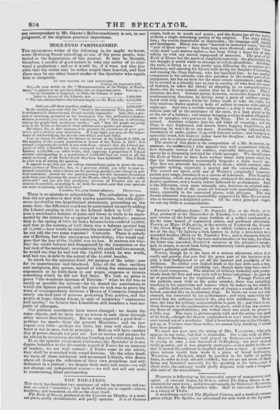THE THEATRES.
THE week has furnished two specimens of what by courtesy and custom are called " novelties ;" but both of which are, as regards subject, incidents, and treatment, as old as the stage itself. The Ezile of Genoa, produced at the Lyceum on Monday, is a musical piece, partly melodramatic and partly operatic. It is of German origin, both as to words and music ; and the drama has all the faults without a single redeeming quality of the original. The story ridicu. bus; the events improbable or impossible; the language stiff, turgid and bombastic. Music was once "married to immortal verse," but the' "pair of blest syrens " have been long since divorced ; and the "Lea. venly maid"—or matron rather.— has been living a loose life of late taking up with any mortal compound of nonsense. The plot of the' Exile of Genoa has the merit of simplicity certainly : the playwright hi not thought it worth while to attempt to veil its absurdities. Anselmo the exile, is living in a very pretty spot, following the avocation of ri fisherman, and amusing his leisure with loving his daughter Florentine, and cursing the Doge Galvani, who has banished him : he has another companion in his solitude, who also partakes in the tender part of his enjoyment, but has no taste for the more severe amusement ; and when he is invited in a friendly way to join in cursing all who bear the name of Galvani, he takes the liberty of objecting to so comprehensive a damn—for the very natural reason that he is Galvani's son. This is situation the first. Galvani junior, however, reconciles himself to the anathematizing Anselmo, by driving away a party of soldiers encum. bered with long spears, whom his father sends to take the exile, but who stand no chance against a body of sailors in canvas suits and red nightcaps. And now a terrible storm arises ; a ship is wrecked ; Flo. rentine puts off to the assistance of the crew, in a boat about as big as the car of a balloon ; and returns bringing a white-headed old gentle. man in spangles, who proves to be the Doge. This is situation the second. Anselmo relapses into his old habit of swearing; and the Doge is very frightened, and kneels down begging forgiveness, and promising he won't do so any more : Anselmo, having exhausted his vocabulary of oaths, makes it up with Galvani senior ; and being in an agreeable mood, lets Galvani junior have his daughter : and the whole party join in a chorus of gratulation. The music of this piece is the composition of a Mr. SCHMIDT, (an amateur, we understand,) who appears very well acquainted with the best dramatic writers of his country, especially MOZART, to whose operas he is frequently indebted for whole passages. We should guess the Exile of Genoa to have been written about forty years since, but that the instrumentation occasionally bespeaks a more recent age. The first act proceeds but heavily to its finale ; which contains some agreeable writing, especially a quartet and the succeeding chorus. The second act opens with one of WEBER'S (originally) unaccom. panied part songs, introduced as a chorus of fishermen. This beautiful composition, which was admirably sung, awakened the attention of the drowsy audience, and a hearty encore followed its performance. Such is the difference, even upon untaught ears, between an original and a copy. To the rest of the music we listened with approbation—sometimes, especially in the concerted pieces, with pleasure. The only female character was most successfully supported by Miss R. AINFORTH, who is becoming a delightful actress. Of the other principal singers we can say little in commendation.


























 Previous page
Previous page